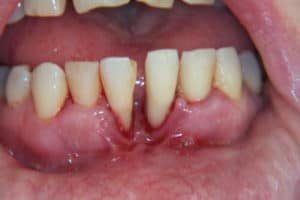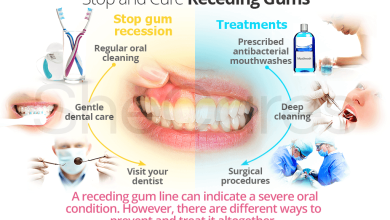Can You Get Dental Implants With Gum Disease?

Yes, dental implants can be placed even if you have gum disease, provided that the disease is treated and controlled beforehand. Gum disease, also known as periodontal disease, can affect the success of dental implants if not properly managed.
However, with proper treatment, including deep cleaning and gum disease management, dental implants can still be a viable option for patients with gum disease. Dental implants offer a long-lasting and stable solution for replacing missing teeth, restoring both function and aesthetics.
By consulting with your dentist and periodontist, you can create a comprehensive treatment plan to address your gum disease and move forward with dental implant placement.
**understanding The Relationship Between Gum Disease And Dental Implants**
Understanding the Relationship between Gum Disease and Dental Implants
Gum disease, also known as periodontal disease, is a common condition that affects the health of the gums and underlying bone. It is caused by the accumulation of plaque and tartar on the teeth, leading to inflammation and infection. When left untreated, gum disease can progress and eventually result in tooth loss.
The impact of gum disease on dental health is significant. It weakens the supporting structures of the teeth, including the gums and bone, making it more difficult to hold and support dental implants. In fact, gum disease is one of the leading causes of implant failure.
Healthy gums are essential for successful dental implants. They provide a stable foundation for the implant to integrate with the bone, ensuring long-term stability and function. If gum disease is present, it must be treated and managed before considering dental implant placement. This may involve non-surgical periodontal therapy or, in severe cases, surgical intervention.
Link between gum disease and tooth loss:
Gum disease is a major contributing factor to tooth loss. The inflammation and infection that occur in gum disease can destroy the supporting structures of the teeth, causing them to become loose and eventually fall out. Additionally, gum disease can also lead to bone loss, further compromising the stability of the remaining teeth.
Importance of healthy gums for successful dental implants:
Healthy gums are crucial for the success of dental implants. They provide the necessary support and stability for the implants to function properly. Inadequate gum tissue can compromise the integration of the implant with the bone, resulting in implant failure. Therefore, it is essential to maintain a healthy oral hygiene routine and seek professional dental care to prevent and treat gum disease before considering dental implant treatment.

Credit: marylandholisticdentist.com
**assessing Gum Disease For Dental Implants Eligibility**
Assessing Gum Disease for Dental Implants Eligibility
In order to determine if dental implants are a suitable option for individuals with gum disease, diagnostic procedures play a crucial role. Dentists use various methods to examine the severity of gum disease and its impact on the candidacy for dental implants.
Diagnostic Procedures for Gum Disease Examination
| Procedure | Description |
| Clinical Examination | Includes a visual inspection of the gums, measuring pocket depths, checking for inflammation, and assessing the amount of gum recession. |
| Dental X-rays | Help identify bone loss, determine the condition of the jawbone, and detect any infections or abscesses. |
| Gum Biopsy | A sample of gum tissue is obtained and examined under a microscope to determine the presence and severity of gum disease. |
Severity Levels of Gum Disease and Its Impact on Dental Implant Candidacy
The level of gum disease plays a significant role in determining eligibility for dental implants. Mild to moderate gum disease may still allow for dental implant placement after appropriate treatment. However, advanced gum disease or periodontitis can lead to bone and tissue loss, making it challenging to support dental implants. In such cases, additional treatments like bone grafting or gum therapy may be required before considering implants.
Factors Determining Eligibility for Dental Implants with Gum Disease
Aside from the severity of gum disease, various factors contribute to the eligibility for dental implants, including overall oral health, the individual’s commitment to oral hygiene, smoking habits, and medical conditions that may affect healing. Consulting with an experienced dentist or periodontist is crucial to assess these factors and determine the most appropriate treatment options for individuals with gum disease.
**managing Gum Disease Prior To Dental Implant Surgery**
Gum disease can complicate the process of getting dental implants. However, with effective management and treatment, it is possible to proceed with implant surgery. Understanding the treatment options for gum disease is crucial before undergoing dental implant placement.
For patients with early stages of gum disease, non-surgical treatments such as scaling and root planing may be recommended. This deep cleaning procedure removes plaque and tartar from above and below the gumline, allowing the gums to heal and reattach to the teeth.
In more severe cases, surgical interventions may be required. Procedures like gum grafting or periodontal flap surgery can address gum recession, reduce pocket depths, and regenerate supporting bone tissues.
Timing is also an important consideration when it comes to dental implant placement. It is crucial to stabilize and control gum disease before proceeding, ensuring the best chances of implant success. Collaborating with both a periodontist and implant dentist ensures a comprehensive approach to managing gum disease and maximizing implant outcomes.
**can Dental Implants Be Placed With Mild Gum Disease?**
Mild gum disease, also known as gingivitis, affects the gums and can cause inflammation, redness, and bleeding. People with mild gum disease may wonder if they are still eligible for dental implants. The severity of gum disease plays a crucial role in determining candidacy for dental implant placement. Dentists evaluate the extent and progression of gum disease to decide whether implant placement is possible or if treatment for gum disease is necessary first.
Mild gum disease presents challenges and risks when it comes to dental implant placement. Inflammation and infection of the gums can compromise the success of implants as the healing process may be affected. However, every case is unique, and guidelines exist to help determine candidacy for dental implants in mild gum disease cases. Factors such as the patient’s oral hygiene, bone density, and overall health are considered. Collaborating with a skilled dentist experienced in dental implants is crucial in making an informed decision.
**overcoming Moderate To Severe Gum Disease For Dental Implants**
The question of whether you can get dental implants with gum disease is a common concern for many patients. If you have moderate to severe gum disease, it may seem impossible to consider getting dental implants. However, with proper treatment and management, it is possible to overcome gum disease and proceed with dental implant surgery.
Treating advanced gum disease is crucial before undergoing dental implant surgery. Your dental professional will need to assess the severity of your gum disease and create a treatment plan to stabilize your oral health. This may involve deep cleanings, scaling and root planing, and in some cases, gum surgery.
Surgical techniques can be used alongside the management of gum disease to ensure successful placement of dental implants. These techniques may include bone grafting, ridge augmentation, sinus lifts, or guided tissue regeneration. Your dentist or periodontist will determine the best approach based on your specific case.
Aftercare and maintenance for patients with a history of gum disease are essential for long-term success with dental implants. Regular dental visits, proper oral hygiene practices, and a healthy lifestyle will help prevent the recurrence of gum disease and ensure the longevity of your dental implants.
**the Impact Of Gum Disease On Dental Implant Success And Longevity**
Gum disease, also known as periodontal disease, can have a significant impact on the success and longevity of dental implants. The presence of gum disease can affect the bone and tissues in the mouth, which are vital for supporting dental implants. It is important to note that not all patients with gum disease are automatically disqualified from receiving dental implants, but the condition does require special attention and care.
Factors Influencing The Success Rate Of Dental Implants In Patients With A History Of Gum Disease:
- Gum disease can lead to bone loss in the jaw, which may affect the stability of dental implants.
- Patients with gum disease often have compromised gum tissues, which may increase the risk of infection around the dental implants.
- Poor oral hygiene practices can contribute to the development or recurrence of gum disease, potentially leading to implant failure.
Long-term Maintenance And Strategies For Preventing Gum Disease Recurrence:
- Maintaining excellent oral hygiene through regular brushing, flossing, and using antimicrobial mouthwashes is crucial for preventing gum disease.
- Regular visits to the dentist for professional cleanings and checkups play a vital role in early detection and intervention to prevent gum disease progression.
- Smoking and certain systemic diseases can also increase the risk of gum disease, so it is important to address these factors for long-term implant success.
Importance Of Regular Dental Checkups And Oral Hygiene Practices:
Regular dental checkups and consistent oral hygiene practices are essential for individuals considering dental implants, especially if they have a history of gum disease. By addressing and preventing gum disease, patients can improve the success and longevity of their dental implants, ensuring a healthy and functional smile for years to come.
**making An Informed Decision: Discussing Options With Your Dental Professional**
Making an Informed Decision: Discussing Options with Your Dental Professional
Open communication with your dental professional is essential when considering dental implants for patients with gum disease. During the consultation, your dentist will assess the condition of your gums and discuss the feasibility of dental implants. If gum disease is present, alternative treatment options will be explored.
It is important to consider the long-term benefits of dental implants in relation to gum disease management. While gum disease can compromise the success of dental implants, proper treatment and maintenance can significantly improve the outcomes. With effective gum disease management, dental implants can provide a durable solution that supports oral health.
Your dental professional will evaluate your specific situation and guide you in making an informed decision. They may refer you to a periodontist who specializes in gum disease treatment to address any concerns. Remember, open communication and collaboration with your dental professional are key to achieving the best possible outcome for your dental implants.
Frequently Asked Questions For Can You Get Dental Implants With Gum Disease?
Does Periodontal Disease Affect Implants?
Periodontal disease can indeed affect implants. It can lead to inflammation and bone loss around the implant, potentially causing it to fail. Maintaining good oral hygiene and regularly visiting the dentist for check-ups can help prevent this.
How Do They Replace Teeth After Gum Disease?
After gum disease, teeth can be replaced through several methods such as dental implants, bridges, or dentures. Implants are surgically placed into the jawbone, while bridges use surrounding teeth as support. Dentures are removable false teeth. Consult a dentist to determine the best option for you.
Can I Get All On 4 Implants If I Have Gum Disease?
Yes, you can get all-on-4 implants even if you have gum disease. The all-on-4 procedure can be customized to address the gum disease and provide a stable foundation for the implants. However, it’s important to consult with a dental professional to determine if you are a suitable candidate.
Can Dental Implants Be Done If You Have Gum Disease?
Yes, dental implants can be done if you have gum disease. However, it’s important to treat the gum disease before proceeding with the implant procedure. Your dentist will assess the condition of your gums and provide appropriate treatment to ensure a successful implant surgery.
Conclusion
It is possible to get dental implants even if you have gum disease. However, proper treatment and management of the gum disease are crucial in ensuring the success and longevity of the implants. Regular visits to your dentist and maintaining good oral hygiene will help minimize the risk of complications.
Consult with your dentist to determine the best course of action for your specific situation.






One Comment